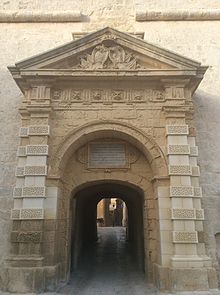 The Greeks Gate of Mdina | |
| Total population | |
|---|---|
| ~20 families (2012 estimate)[1] | |
| Regions with significant populations | |
| Island of Malta (Valletta, Birgu) | |
| Languages | |
| Maltese, English and Greek | |
| Religion | |
| Greek Byzantine Catholic Church, Catholic Church, Greek Orthodox Church | |
| Related ethnic groups | |
| Greek diaspora, Griko people, Maniots, Maltese people |
Greeks in Malta (Greek: Έλληνες της Μάλτας, Ellines; Maltese: Griegi) have a long presence in Malta, which may lead back to ancient times. The archipelago was intensely Hellenized beginning in the 3rd century BC, a process which intertwined with the Christianization of Malta after the 1st century AD. The Byzantine presence was overturned by the Arab conquest of 870, and the surviving Greek community was Islamified. Maltese Christianity of the Byzantine Rite was only preserved in some parts of the country, being especially important in Gozo. These groups formed the basis for a local branch of the Eastern Orthodox Church, revived following Norman conquest in the 1120s. Although marginalized by Catholicism, which became the dominant faith, a Greek-speaking Eastern Orthodox community survived into the 15th century.
Greek immigration was resumed in the 1520s, shortly before the establishment of Hospitaller Malta. It comprised mainly refugees from the Ottoman Empire, hundreds or thousands of whom escaped from Rhodes. They reestablished the Greek Orthodox colony, presumed to have been placed under the Archbishopric of Ohrid, but also included in their ranks Greek-speaking members of both the Latin Church and Greek Byzantine Catholic Church. Within fifty years, with the onset of Counter-Reformation, the former community was pressured into merging with the latter two. By 1600, the Eastern Orthodox Greeks had formally abjured, but in various documented cases continued to practice their older rites. In tandem, the consolidated community of Catholic Greeks discarded its traditional center in Birgu and moved its base to Valletta, after which it became prone to assimilation into the ethnic mainstream.
In the 17th century, the Eastern Orthodox presence was also reinforced by Ottoman Greeks taken as slaves by the Maltese privateers, some of whom were themselves ethnic Greeks; there were also new waves of Maniots and Aetolians. Though small in numbers, the resulting community participated in the propagation of Greek nationalism and of the "Greek Plan". Many local Greeks also supported the French occupation of Malta, which closely preceded a Franco–Ottoman war. During the period of British colonization, the Maltese Greek community leader Ioannis Papafis was a sponsor of the Greek War of Independence. Greeks affiliated with either Catholicism or Eastern Orthodoxy remained present over the following centuries, though the latter community continued to be informally marginalized throughout the 19th century, and are now a small minority.
© MMXXIII Rich X Search. We shall prevail. All rights reserved. Rich X Search
